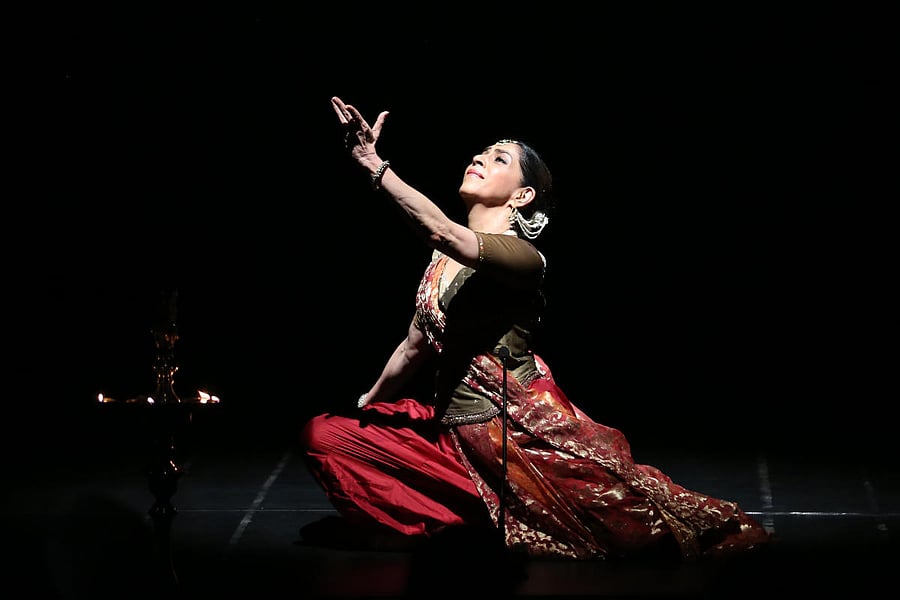
R enowned Kathak dancer and choreographer Aditi Mangaldas, in her latest performance, envisioned the concept of ‘Lotuses Blossom’ through the ever-widening circles of life. “Everything is linked and interconnected in this universe — from tiny atoms to vast galaxies, the simplest to the most complex, the mighty and the minute. Within these circles of life is the beautiful flowering lotus, stating, ‘Yes, I am!’” she explains.
Mangaldas started dancing at a very young age. Her family, which belongs to the world of academics and business, spotted artistic talent in her and decided to put her into music, dance and fine art classes.
Over time, dance remained her calling. Belonging to a family with a liberal outlook, Mangaldas didn’t have to always agree with her parents. “They encouraged me to question everything and believed that nothing was carved in stone and if we took our own decisions, we should be ready to face the consequences,” she says.
Further, she was lucky to have gurus like Kumudini Lakhia and Pandit Birju Maharaj, who in their own different and yet similar ways, evolved Kathak and its rich repertoire.
“I think the courage to dance my own dance has come because of the great liberal attitude that my close family has, my two gurus, and eventually, the lessons one learns from life and the experiences one gathers,” she reminisces.
At a point in her life, Mangaldas felt immersed in issues, subjects and emotions that could not be conveyed within the broader parameters of the vocabulary of Kathak. The outcome of this conflict was her contemporary work based on the classical form.
“When I plant a seed of Kathak and water it with Kathak sensibilities, then the tree that grows out is a Kathak tree but that will remain particularly my kind of Kathak tree. However, when I plant the seed of Kathak and water it with contemporary sensibilities, movement, music, text, literature and stage design, the tree that grows out of it reaches another part of the sky, even though the roots are firmly that of Kathak,” she explains. Mangaldas’ Delhi-based dance company, the Drishtikon Dance Foundation, recently presented two unique initiatives — the second edition of the Dr Sunil Kothari Award for Emerging Artists as well as The Parabola of Dance.
They have also been working on two major productions — a contemporary solo based on Kathak called Forbidden and a duet called Mehek with the British dancer/choreographer Aakash Odedra. Forbidden premieres on December 4, 2022, at the National Centre for the Performing Arts in Mumbai.
With collaborations with some of the world’s top designers, music composers and artistic minds, Forbidden addresses a subject that is uncomfortable and not discussed in the realm of classical art forms. It questions why the world is scared of female sexual desire.
“Why is it, world over, from time immemorial, in conservative as well as liberal societies, women are sanctioned, controlled, hounded, judged and eventually punished for having the courage to own their sexual desire?” she asks.
The project was realised after months of internalisation, debate, troughs and peaks. “Female sexuality is private but the taboos attached to it require and demand we take a stand on the universal, public and personal front,” she adds.
For Mangaldas, life is her greatest inspiration — both human and nature made.
“Inspirations come in myriad forms, whether it is poetry, going to a museum, seeing fine art, a beautiful piece of music, a great sunset, a sliver of the new moon, a flower flowering or majestic architecture,” she muses.
During the pandemic, she also created a few short films to support the performing arts community. The dancers and musicians of her repertory were spread across the country and abroad.
While practising dance daily on Zoom, they decided to work on short dance films called Within... From Within.
By taking aspects of their previous production, Within, the film, was interwoven with clips of the performance interspersed with their personal feelings of anxiety and isolation.
Eventually, they made the films public and requested donations. The funds generated were able to support 60 families for a month. The films have been screened at a couple of international dance film festivals across the world.